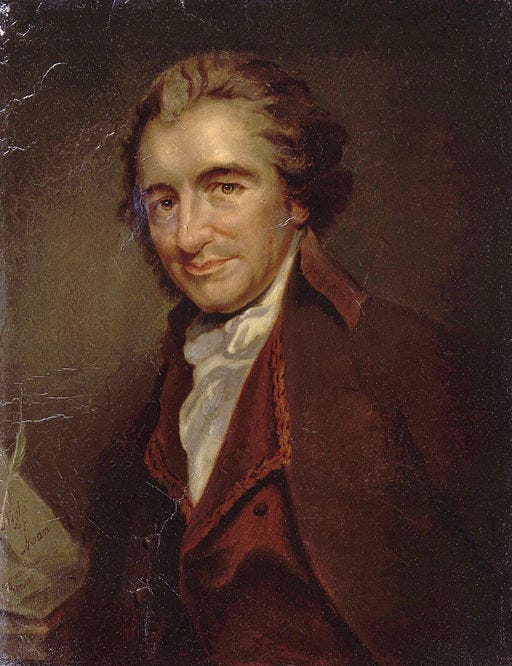TWIH: Thomas Paine passes away
He is best known as the author of Common Sense, a pamphlet that advocated for independence from Great Britain. Its blunt assessment rocked Revolutionary War America.
At about this time in 1809, Thomas Paine passes away. Paine is best known as the author of Common Sense, a pamphlet that advocated for independence from Great Britain. Its blunt assessment of the situation rocked Revolutionary War America.
The pamphlet was an instant hit.
“Common Sense was the most incendiary and popular pamphlet of the entire Revolutionary era,” historian Gordon Wood explains, “it went through twenty-five editions in 1776 alone. . . . Unlike more genteel writers, Paine did not decorate his pamphlet with Latin quotations and learned references to the literature of Western culture, but instead relied on his readers knowing only the Bible and the Book of Common Prayer.”
This approach, Wood concludes, brought “the common people” into the philosophical debate over whether to declare independence.
Paine had come from humble beginnings, born and raised in a Quaker community in England. His family was poor and his education simple, but he would later remember reading a book about America. It fascinated him.
“I happened, when a school boy,” he later wrote, “to pick up a pleasing natural history of Virginia, and my inclination from that day of seeing the western side of the Atlantic never left me.”
He wouldn’t make it to America until he was in his late 30s. He’d met Benjamin Franklin, who was then living in London. He’d gotten a letter of introduction and soon found himself in Pennsylvania, working as an editor for Pennsylvania Magazine.
He was asked to write a pamphlet defending the case for American independence.
“Society in every state is a blessing,” the pamphlet began, “but Government, even in its best state, is but a necessary evil; in its worst state an intolerable one.”
Methodically, Paine took his readers step-by-step through the need for independence: What is the proper sphere of government and what are its purposes? Is the concept of a monarchy legitimate?
“Government by kings was first introduced into the world by the Heathens, from whom the children of Israel copied the custom,” Paine told his readers. “It was the most prosperous invention the Devil ever set on foot for the promotion of idolatry.”
Hereditary monarchies are even worse. “Men who look upon themselves born to reign, and others to obey, soon grow insolent; selected from the rest of mankind their minds are early poisoned by importance.” By the time they succeed to office, they “are frequently the most ignorant and unfit of any throughout the dominions.”
He scathingly referred to the King as a “Royal Brute.”
Reconciliation was pointless, Paine thought. Great Britain would not keep its word. The repeal of the Stamp Act, followed by imposition of new taxes, was proof enough.
“The authority of Great-Britain over this continent, is a form of government, which sooner or later must have an end,” Paine emphasized. He reminded his readers of what happened in Boston and noted that any of the colonies could soon experience the same. “Every quiet method for peace hath been ineffectual. Our prayers have been rejected with disdain; and only tended to convince us, that nothing flatters vanity, or confirms obstinacy in Kings more than repeated petitioning.”
There was nothing to do but to separate. “Until an independence is declared,” Paine concluded, “the continent will feel itself like a man who continues putting off some unpleasant business from day to day, yet knows it must be done, hates to set about it, wishes it over, and is continually haunted with the thoughts of its necessity.”
Just six months after Paine’s fiery words were published, the Continental Congress approved the Declaration of Independence.
Our fight for freedom was on.
Sources can always be found on my website, here.



What insightful thinking. You could replace “monarch” with “politician” and the shoe still fits.
Noteworthy that he aimed his writing at those familiar with the principles of the Bible to frame his argument.